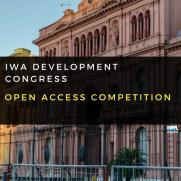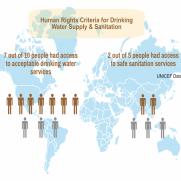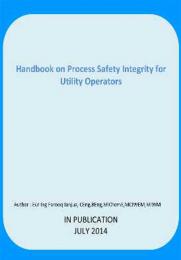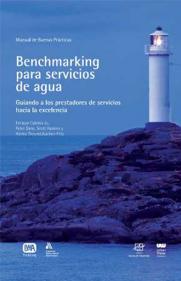 IWA Development Congress - Open Access Waiver Competition
IWA Development Congress - Open Access Waiver Competition
In honor of this year's IWA Development Congress in Buenos Aires, we gave delegates the chance to win a 100% fee waiver to publish their paper Open Access in any one of our 12 IWA Journals.
...
 Translating Human Rights criteria into operational terms
Translating Human Rights criteria into operational terms
Translating the Human Rights criteria into action is a challenge for water and sanitation professionals, particularly for regulators. Mohamed Tawfik and the IWA Communications department for Water Policy and Regulation have procvided a helpful outline and infographics to illustrate some of the key criteria & principles in relation to drinking water supply and sanitation services.
Leading Edge Technologies 2017 series: Ivan Kozyatnyk
To celebrate the Leading Edge Conference on Water and Wastewater Technologies (LET 2017), we spoke to key authors and editors about the event and exciting technological developments in the field.
Leading Edge Technologies 2017 series: Peng Wang
To celebrate the Leading Edge Conference on Water and Wastewater Technologies (LET 2017), we spoke to key authors and editors about the event and exciting technological developments in the field.
Author interview: Michiel Tukker
Michiel Tukker, co-author of the recently published Hydraulic Design and Management of Wastewater Transport Systems, offers insight into his new book, his research and a new project in partnership with Delft University.
The Impact of Privatisation on the Sustainability of Water Resources
This research investigates potential contributions by the privatization of water production to sustainability of water supply. The main objective is to examine the perceptions of stakeholders concerning privatization as a water governance model and its contribution to water sustainability.
This research provides a robust reference for future planning in the water sector, hinting at the importance of considering public-private partnerships at the federal level as an appropriate model for water sustainability.
Integrated Water Resources Management: Basic Concepts
IWRM is based on the three principles: social equity, economic efficiency and environmental sustainability. Considering these principles means answering the following questions:
- How will my decision/ action affect access for other users to water or the benefits from its use?
- Will my decision/ action result in the ‘most efficient use of the available financial & water resources?
- How will my decision/ action affect the functioning of natural systems?
 Handbook on Process Safety Integrity for Utility Operators
Handbook on Process Safety Integrity for Utility Operators
This handbook is intended for utility operators to explain the process safety integrity issues with the focus on maintaining the long term sustainability, efficiency and effectiveness of the utility assets. It is hoped this handbook provides the basis of the essentials for managers and key engineers responsible for the ownership , operation and maintenance of assets in the utility sector.
 Benchmarking Para Servicios de Agua
Benchmarking Para Servicios de Agua
eISBN: 9788483638651
Benchmarking has become a key tool in the water industry to promote and achieve performance targets for utilities. The use of this tool for performance improvement through systematic search and adaptation of leading practices, has expanded globally during the past decade. Many ongoing projects worldwide aim to address different needs and objectives, in varying contexts, with outstanding results and impact. Benchmarking Water Services provides valuable information to everyone interested in benchmarking in the water industry. The text is aimed at utilities considering joining a benchmarking project, experienced practitioners in charge of organizing a benchmarking exercise, consultants, regulators and researchers. The document is presented with a clear practice oriented approach and can be used as a how-to-benchmark guide presented from different perspectives (participants, organizers, supervising bodies). Readers will gain practical insight on real life benchmarking practices and will benefit from the experiences gained in some of the leading benchmarking projects of the water industry (including the IWA-WSAA benchmarking efforts, the European Benchmarking Co-operation and the several benchmarking projects carried out in Austria and Central Europe). The manual also presents the new IWA Benchmarking Framework, which aims to harmonize the terms used to describe benchmarking and performance indicators practices in the water industry, guaranteeing a more fluent and efficient communication.
This Manual of Best Practice is edited by the IWA Specialist Group on Benchmarking and Performance Assessment, and co-published by AWWA and IWA Publishing. ----- Praise for Benchmarking Water Services: "The continual trend of conceptual to specifics throughout the book provides for an educational experience each time the book is either casually perused or carefully studied." "The authors (Cabrera, Haskins and Fritiz) diligently pursue the focus of improvement." "Benchmarking Water Services is an in depth and practical ‘must have’ guide for any utility currently engaged in or planning to develop a benchmarking process" - Gregory M. Baird (2012) Benchmarking: An International Journal 19:2.